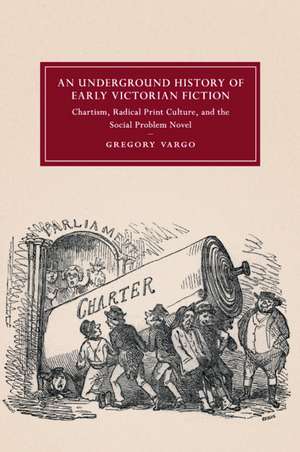An Underground History of Early Victorian Fiction: Chartism, Radical Print Culture, and the Social Problem Novel: Cambridge Studies in Nineteenth-Century Literature and Culture, cartea 110
Autor Gregory Vargoen Limba Engleză Paperback – 27 feb 2019
| Toate formatele și edițiile | Preț | Express |
|---|---|---|
| Paperback (1) | 285.75 lei 6-8 săpt. | |
| Cambridge University Press – 27 feb 2019 | 285.75 lei 6-8 săpt. | |
| Hardback (1) | 697.28 lei 6-8 săpt. | |
| Cambridge University Press – 6 dec 2017 | 697.28 lei 6-8 săpt. |
Din seria Cambridge Studies in Nineteenth-Century Literature and Culture
-
 Preț: 177.52 lei
Preț: 177.52 lei -
 Preț: 176.76 lei
Preț: 176.76 lei -
 Preț: 236.96 lei
Preț: 236.96 lei -
 Preț: 294.81 lei
Preț: 294.81 lei -
 Preț: 238.02 lei
Preț: 238.02 lei - 9%
 Preț: 627.20 lei
Preț: 627.20 lei - 23%
 Preț: 591.70 lei
Preț: 591.70 lei -
 Preț: 236.78 lei
Preț: 236.78 lei -
 Preț: 447.28 lei
Preț: 447.28 lei -
 Preț: 177.67 lei
Preț: 177.67 lei -
 Preț: 177.72 lei
Preț: 177.72 lei - 8%
 Preț: 530.41 lei
Preț: 530.41 lei - 9%
 Preț: 593.57 lei
Preț: 593.57 lei -
 Preț: 237.41 lei
Preț: 237.41 lei - 9%
 Preț: 627.50 lei
Preț: 627.50 lei -
 Preț: 201.59 lei
Preț: 201.59 lei - 11%
 Preț: 580.30 lei
Preț: 580.30 lei - 11%
 Preț: 697.14 lei
Preț: 697.14 lei - 11%
 Preț: 580.45 lei
Preț: 580.45 lei -
 Preț: 202.74 lei
Preț: 202.74 lei - 9%
 Preț: 592.31 lei
Preț: 592.31 lei - 11%
 Preț: 641.67 lei
Preț: 641.67 lei - 11%
 Preț: 584.77 lei
Preț: 584.77 lei - 11%
 Preț: 642.48 lei
Preț: 642.48 lei - 11%
 Preț: 694.58 lei
Preț: 694.58 lei -
 Preț: 287.28 lei
Preț: 287.28 lei - 11%
 Preț: 582.20 lei
Preț: 582.20 lei -
 Preț: 286.42 lei
Preț: 286.42 lei -
 Preț: 317.11 lei
Preț: 317.11 lei -
 Preț: 283.63 lei
Preț: 283.63 lei -
 Preț: 283.03 lei
Preț: 283.03 lei -
 Preț: 296.72 lei
Preț: 296.72 lei -
 Preț: 353.48 lei
Preț: 353.48 lei -
 Preț: 290.16 lei
Preț: 290.16 lei -
 Preț: 286.69 lei
Preț: 286.69 lei -
 Preț: 282.65 lei
Preț: 282.65 lei -
 Preț: 285.54 lei
Preț: 285.54 lei -
 Preț: 326.39 lei
Preț: 326.39 lei
Preț: 285.75 lei
Nou
Puncte Express: 429
Preț estimativ în valută:
54.68€ • 56.74$ • 45.71£
54.68€ • 56.74$ • 45.71£
Carte tipărită la comandă
Livrare economică 15-29 martie
Preluare comenzi: 021 569.72.76
Specificații
ISBN-13: 9781316647912
ISBN-10: 1316647919
Pagini: 298
Dimensiuni: 150 x 228 x 15 mm
Greutate: 0.4 kg
Editura: Cambridge University Press
Colecția Cambridge University Press
Seria Cambridge Studies in Nineteenth-Century Literature and Culture
Locul publicării:Cambridge, United Kingdom
ISBN-10: 1316647919
Pagini: 298
Dimensiuni: 150 x 228 x 15 mm
Greutate: 0.4 kg
Editura: Cambridge University Press
Colecția Cambridge University Press
Seria Cambridge Studies in Nineteenth-Century Literature and Culture
Locul publicării:Cambridge, United Kingdom
Cuprins
Introduction: can a social problem speak?; 1. Social inheritance in the New Poor Law debate: William Cobbett, Harriet Martineau, and the Royal Commission of Inquiry; 2. Books of (social) murder: melodrama and the slow violence of the market in anti-New Poor Law satire, fiction, and journalism; 3. A life in fragments: Thomas Cooper's Chartist Bildungsroman; 4. Questions from workers who read: education and self-formation in Chartist print culture and Elizabeth Gaskell's Mary Barton; 5. Revenge in the age of insurance: villainy in theatrical melodrama and Ernest Jones's fiction; 6. 'Outworks of the citadel of corruption': the Chartist Press reports the empire; 7. Two nations revisited: the refugee question in the People's Paper, Household Words and Charles Dickens's A Tale of Two Cities.
Recenzii
'Comparing revolutionary bloodshed with the gradual violence of famine in Ireland, Vargo notes, '[the Star] asks why one merits sensational prose little notice' … In thus stressing the Chartists' desire to make melodramatic language applicable to daily oppression as well as to outbursts of violence, Vargo instantly reminded me of Zola and other natural polemicists. Altogether, he sheds important light on the almost subvocalized conversations that precede those very public debates of the fin de siècle.' John Plotz, Review 19 (www.nbol-19.org)
'… a gentle but persuasive challenge to some of the critical commonplaces surrounding Victorian social problem writing.' Juliette Atkinson, The Times Literary Supplement
'[An Underground History of Early Victorian Fiction] successfully demonstrates the utility of the notion of 'generative exchange' as a way of thinking about cross-class cultural relations.' Mike Sanders, Labour History Review
'Vargo's book enlarges our understanding of the topics addressed in Chartist discourse while also describing the self-consciousness and self-presentation of Chartist print culture, its ways of designating itself within the public sphere. In this regard, it does for the Victorian radical press specifically what Kevin Gilmartin did for the radical press of the early nineteenth century in his Print Politics (1986).' Catherine Gallagher, Modern Philology
'… a gentle but persuasive challenge to some of the critical commonplaces surrounding Victorian social problem writing.' Juliette Atkinson, The Times Literary Supplement
'[An Underground History of Early Victorian Fiction] successfully demonstrates the utility of the notion of 'generative exchange' as a way of thinking about cross-class cultural relations.' Mike Sanders, Labour History Review
'Vargo's book enlarges our understanding of the topics addressed in Chartist discourse while also describing the self-consciousness and self-presentation of Chartist print culture, its ways of designating itself within the public sphere. In this regard, it does for the Victorian radical press specifically what Kevin Gilmartin did for the radical press of the early nineteenth century in his Print Politics (1986).' Catherine Gallagher, Modern Philology
Notă biografică
Descriere
Explores the journalism and fiction appearing in the early Victorian working-class periodical press and its influence on mainstream literature.
